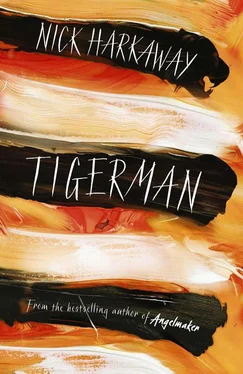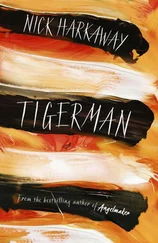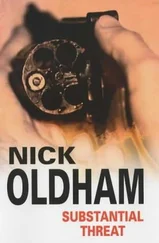He rolled his head around slowly on his neck as if this was what it had been about, as if he had planned everything to bring them all to this moment. The sound of his breathing, amplified and alarming, filled the square. He took the sharkpunch from his belt and held it in his right hand, twirled it like a swordsman, then threw his left hand forward in a stabbing gesture that reminded him instantly of Sandrine and her knife. With his index finger, he indicated the biggest and ugliest of the Quads, hanging by one arm from the fountain, and fixed his eyes — the mask’s eyes — on the Quad’s face. He did not speak. He just pointed, and waited, and let the challenge stand.
Waited.
And waited.
And the Quad did not come.
The Sergeant would fall on his knees soon. Would pass out. Nothing in his life had prepared his body for that pointless dash through the backstreets. He measured it in his mind. Three miles? Four? At top speed, desperation speed. He would fall, surely, any moment now. He shifted his feet, feeling for the vibration in the ground, and realised that it had stopped, that for the first time in days everything was still. He saw everyone else realise it too, with relief and an unlikely sense of loss.
Something was happening at the back of the crowd. A weird susurrus was spreading out in waves, words exchanged and shared, accounts of witnesses and testimonies, and out of all of them emerged that one word so that it ebbed and flowed in the tide of whispers but never vanished, and moment by moment it actually grew, strengthened and unified, and here was a young man with a phone holding it high for others to see — video, more bloody video, always someone. But now it seemed there were more cameras, more angles, and the square was lit as if by candles with glowing screens and tiny cameo recordings. Tigerman flew from a burning house with a sick woman in his arms. He stopped a rape, or a murder. He rescued a child. He chased, always, impossibly and indefatigably, chased an abduction by someone in a foreign car, a Fleet car, chased and would not give up even though his breathing rasped and his feet twisted. Tigerman. And then, here, at last, he let it go, because for all that he had done in his quest, this moment in the square was more important, not to him but to them. Tigerman. Tigerman. Tigerman . He was not Fleet. He was not Britain or America or France or anywhere except Mancreu, Mancreu looking out for its own. Tigerman, Tigerman, Tigerman , and the noise was louder than anything he had ever heard. Tigerman , for Mancreu, because they needed him so very, very much.
The Quad shook his head, threw his mask down on the ground.
They carried the Sergeant through the town, and where they went they put out the fires. Small groups broke away from the main throng and became anything from street sweepers to civil engineers, and road by road and house by house the sound of Beauville became a goosegabble of hammering and mending.
The Quads were gone, not merely vanished or fled but publicly retired, even unmade. As one they rolled their bikes into the harbour and knelt — to the Sergeant’s vast embarrassment — to receive his absolution. He wanted to tell them all to apologise to the old lady for killing her dog. And to anyone else whose beloved pet they had crucified. But then he would have to take them to task for sins more dire and ultimately there would be blood, again. It was not his choice to make, and he had no desire, anyway, to see them dangle and kick from the dockyard cranes. This, though, surely this was too much?
He cast around for an escape but found none, so he duly placed a gloved hand on each of twenty heads and pressed down without words, and saw that half of them were weeping and prostrating themselves and had to be lifted up by the crowd. They would make redress where they could and carry the guilt otherwise, and that was all that the world offered anyone, for crimes and omissions large or small.
Everywhere, the press pack followed. They spoke to men and women on the fringes of the crowd, but when they occasionally ventured closer the crowd drew together to keep them away. Tigerman was a mystery, and they did not want him unmasked, did not want him to promise things or demand things, did not like it when he spoke at all. His existence was his meaning, and if he tried to encapsulate himself he might get it wrong. Which was entirely acceptable to the man inside the mask, whose stubble was beginning to itch against the slick surface, and who wanted above all else to get away, to lie down and sleep. He had work. He had work and he must find Sandrine for the boy, he must pretend again to look for himself, to track himself across the island. He must speculate with Arno. He must find out about his powers and responsibilities towards adopted quasi-orphans and how he could account for and care for the boy’s mother.
The boy. The boy had a name. He had read it, but it had felt unfitting and he had forgotten it. Boy. Boy. Son? He whispered the word and heard it echo, saw the nearest members of the crowd flinch slightly.
His focus was fading, his eyelids appallingly heavy. Soon he would black out or sleep, and there would be very little difference. He had to get away. But they were relentless: he must see everything, bless everything, and how long before they took him to the NatProMan building and expected it to fall before him like the walls of Jericho? And would Kershaw and Arno be circumspect with the Tigerman at their gates, or would they reckon to snatch him first and apologise later, to unravel the mystery? He was walking through water, through thick, clear oil, and it was cold.
And then he was rescued.
As they walked along the harbour front and he nodded to the teams of men and women clearing away the rubble of Beneseffe’s line in the sand, five men emerged from a side road wearing gas masks and firefighting gear and stood in a silent line, not so much like soldiers or workmen as monks at their offices. There was a solemnity about them, a sense of ritual and place.
The gear they wore was not his gear — not from his armoury — but a hodgepodge of local stuff. All the same it had been cobbled together somehow to make it just a little Tigerman-ish, to suggest his suit without actually being like it. They wore long coats and let their arms hang by their sides. They did not move or speak, they just waited in the faint light of the predawn. The crowd slowed and stopped, and somehow knew that they must let him go, that it was time.
Knowing it was intended, and too tired to doubt that it was wise, he walked slowly through the crowd and felt reverent hands reach out to touch him as he passed, to take a blessing from his back and shoulders, touch the stele on his chest.
The masked men did not acknowledge him as he walked between them. They did not turn their heads. Instead, as soon as he was through them they folded in behind him like an honour guard, and then streamed around him, ahead of him into an empty house and out again, heading in different directions all at once so that his own path became curiously invisible. As the last one peeled away he gave the Sergeant a gentle push: go straight ahead .
He managed one last effort, made his feet work, wished he could take off his heavy coat, the utility belt with all its useless toys.
Outside, in a backstreet, a car was waiting for him, battered and a little scorched. Flotsam, like him. He climbed in.
‘Just friends,’ the boy said hastily, gesturing back along the side road as he drove off. ‘They do not know you. Know only that Tigerman must disappear now, that we help him. They do not ask how I know. It is holy now.’
The Sergeant nodded, too tired to worry.
‘That was leet,’ the boy said after a pause. ‘It was the most leet. Onehunnerten pro cent thirteen thirty-seven. You are full of win.’
Читать дальше
Конец ознакомительного отрывка
Купить книгу











